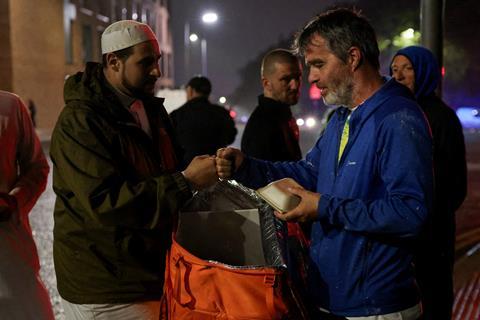When Muslims fed rioters who meant them harm, they were following in Abraham’s footsteps, says George Pitcher. And perhaps setting us all an example of how to better overcome extreme hostility

It was a display of such radical hospitality that BBC News reported it at the end of its 10pm bulletin, as if to deliberately separate it from the numbing scenes of Britain’s cosplay fascisti kicking in the doors of Muslim homes after – God help us – setting fire to a hotel with migrant women and children in it, while blocking the exit.
The late, short report was of a sign of “hope and reconciliation” outside the Abdullah Quilliam Mosque in Liverpool, the oldest one in England, where an imam and volunteers, in “a leap of faith”, shared food with the rioters who, moments before, would do them harm.
“Our kitchen staff were amazing,” said Adam Kelwick. “We made preparations in advance to get 200 burgers ready. We took the bag of food. We smiled at people. Before you knew it, we were sharing food with them.”
With humility and hospitality, a radical alternative can emerge
They undoubtedly put themselves at risk; it could easily have “gone pear-shaped”, conceded the mosques’s chairman Abdul Hamid. That’s what makes it radical.
This isn’t just inspiring; it shames the mosque’s home nation. There is a direct correlation - although she would not have intended it - between former home secretary (and subsequent prime minister) Theresa May’s “hostile environment” for illegal migrants in 2012, and the racist violence we’re witnessing today.
Correlation doesn’t imply causation, though other powerful people, such as Nigel Farage and Elon Musk, might inspect their consciences for the latter. But what we can be sure about is that a hospitable environment transforms the hatred and violence that a hostile environment foments.
OK, we might argue that the demonstrators were just plain hungry. Hunger beats anger every time. But there’s still something else going on here. It’s about an appropriate response to the violent events in the wake of the murders of three young girls in Southport – and the misinformation that surrounded them – which have lanced the festering boil of the UK’s hostility to migrants.
Radical hospitality
The radical hospitality shown outside Liverpool’s mosque can and might de-escalate that destruction. Peter Meadows has written here on the power of hospitality in ministry, though he confines his analysis to what we might call domestic hospitality.
I want to look at the possibilities of national hospitality, by which I mean the kind of hospitable environment that’s a national and political policy. As a response to migration, former chancellor Angela Merkel came close to it in Germany. Speak it softly, but what if we welcomed migrants into our communities? It might look at bit like the Liverpool mosque’s burger and chips. Could we follow - and also set - that example?
I know what you’re thinking. The problem is with illegal migrants. A national Church surely cannot conspire with law-breaking. Two points on that: Rioters throwing bricks and chanting racist slogans are demonstrably breaking the law, but it didn’t stop the mosque they were attacking from reaching out to them with bread to break together.
Secondly, there is no reason why hospitality can’t co-exist with the rule of law. If it did not, there would be no prison chaplaincies.
Radical hospitality can sit alongside a robust legal process. To assist migrants with this process is an act of hospitality for those who have legal asylum here. Those who don’t, and are to be returned to a safe country of origin, are still to be treated compassionately - and we can help with that too, alongside aid organisations.
Pushing for more
We should be pushing at a door that is at least ajar to radical hospitality. The machinery of the hostile environment is already being decommissioned, in the scrapping of the Rwanda refugee drain and the off-hiring of the Bibby Stockholm detention hulk. These riots could be seen as the final explosion of the noxious gas.
Radical hospitality is really a derivative of radical humility, a potent counter to the kind of personality politics that has poisoned democracy on both sides of the Atlantic. With humility and hospitality, a radical alternative can emerge.
There will be stumbling blocks from those who, understandably, would claim that this is a Pollyanna gospel, the kind of irrepressible optimism and childlike naivety that gets us all killed. But that’s to deny the kind of hope that was displayed in action outside Abdullah Quilliam mosque.
A hospitable environment transforms the hatred and violence that a hostile environment foments
If we can replicate that nationally, we might get somewhere – the kind of place that replaces “us and them” with “we”; the sort of country that Keir Starmer (an atheist) spoke of, returning to the idea of service - a service ministry that is at the heart of the Abrahamic faith that we share with the Muslims who fed rioters in Liverpool.
Servant ministry is not without its dangers. But no one ever said the gospel was safe. Breaking bread with strangers, listening to them and welcoming them carries its risks.
Liverpool shows that that they are risks worth taking, though. And such radical hospitality has powerful provenance. Our faith is, after all, rooted in the story of Abraham “entertaining angels unawares” (see Hebrews 13:2).
While it’s a stretch to describe rioting yobs as angels, we might look quizzically at those who take them food.







































1 Reader's comment